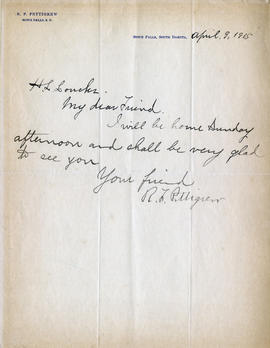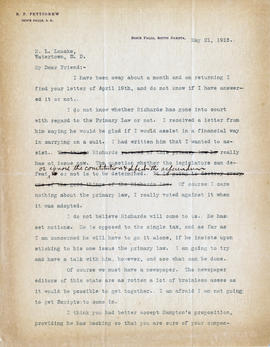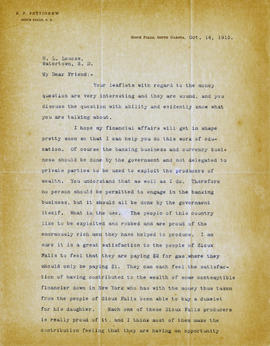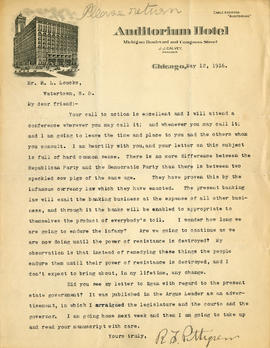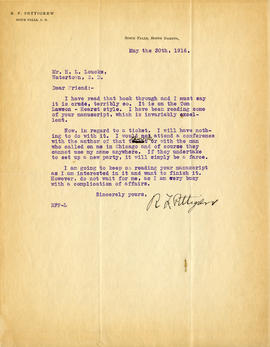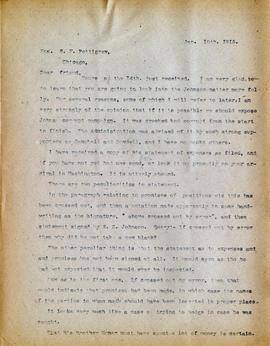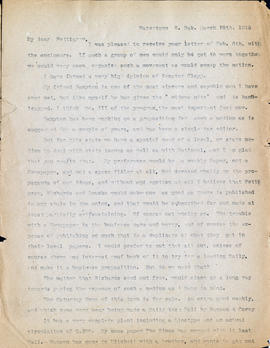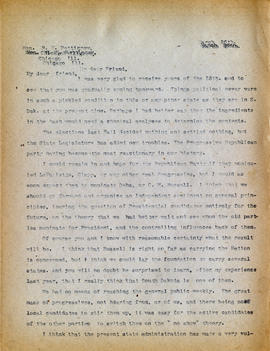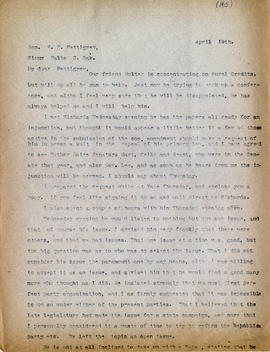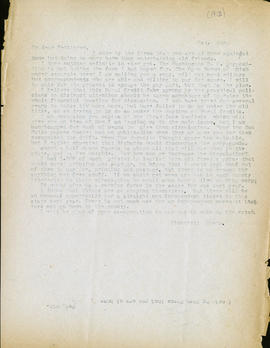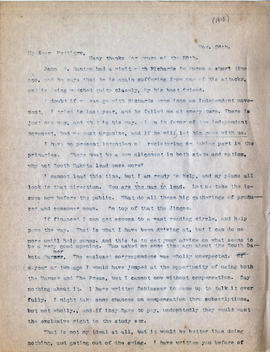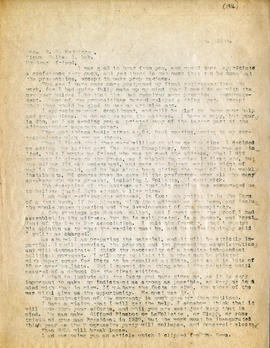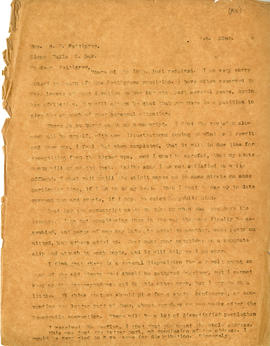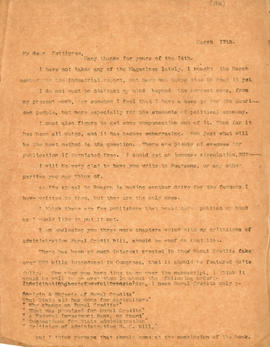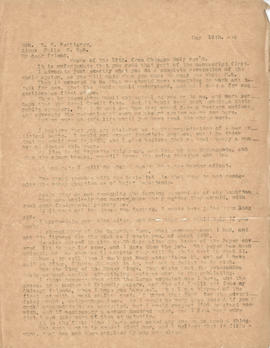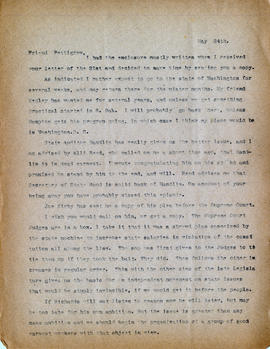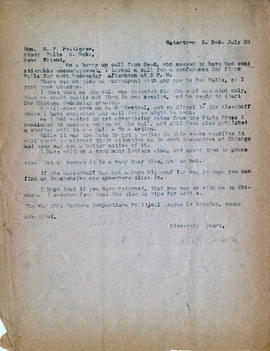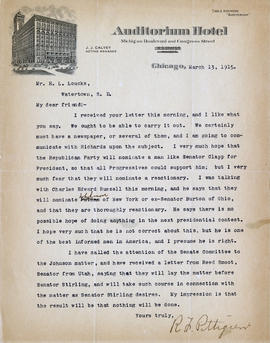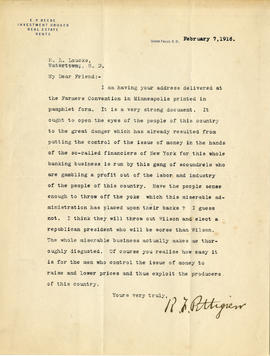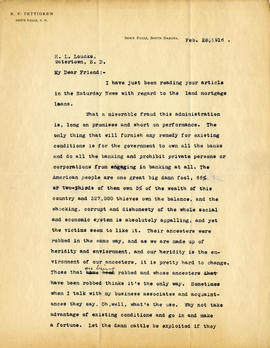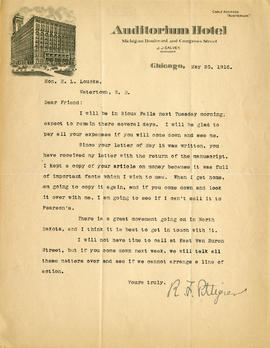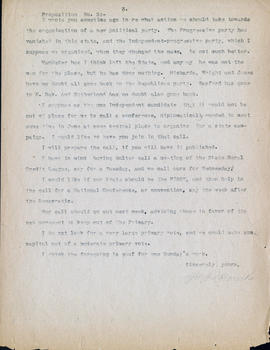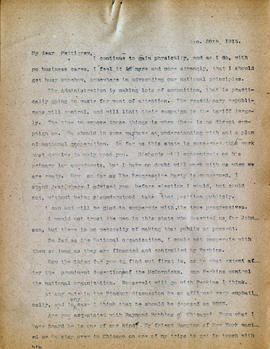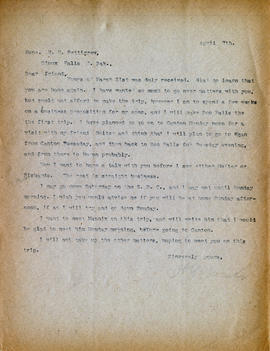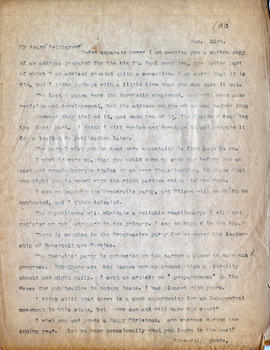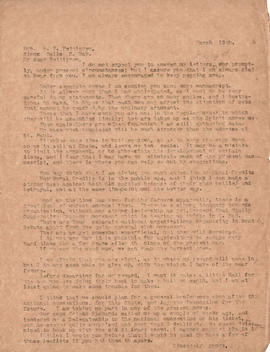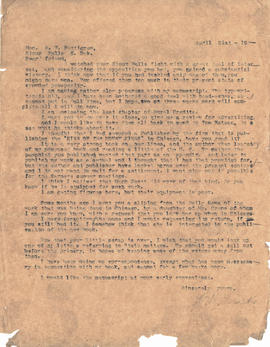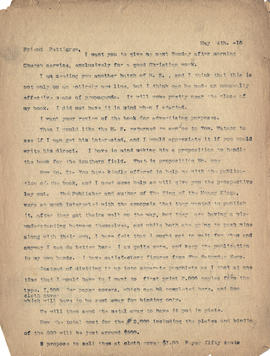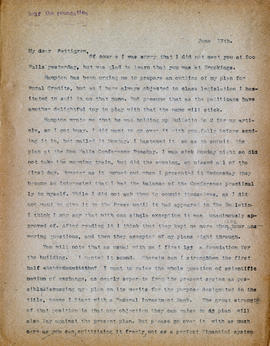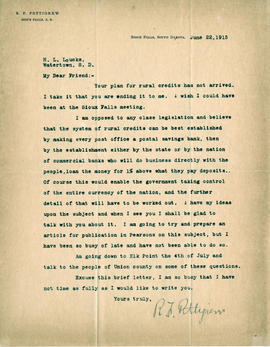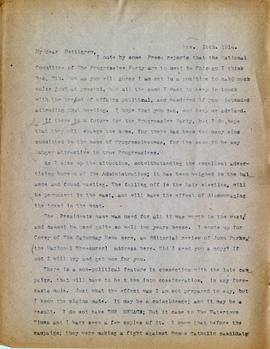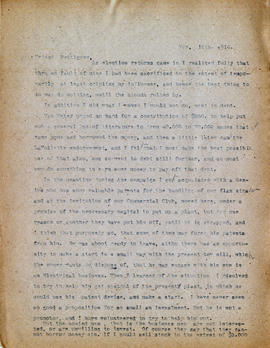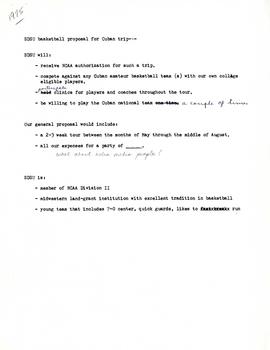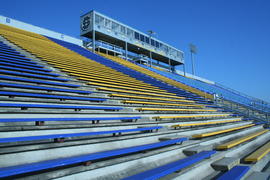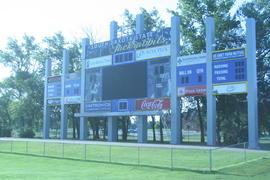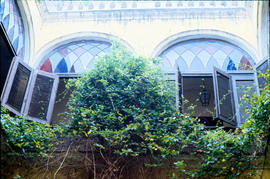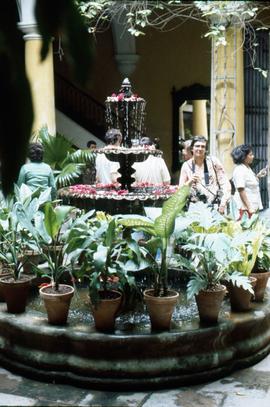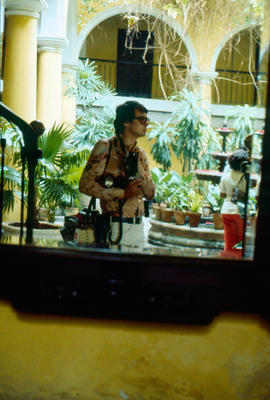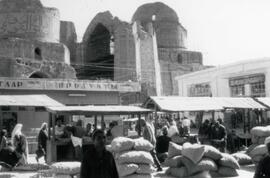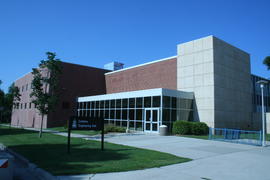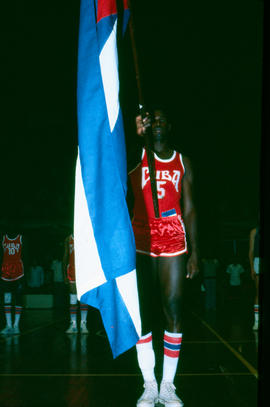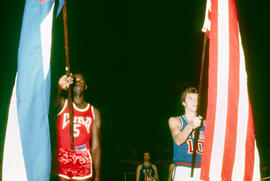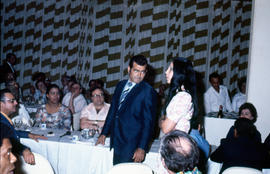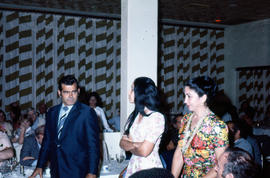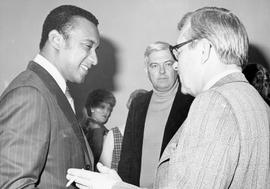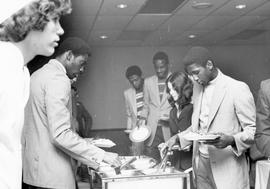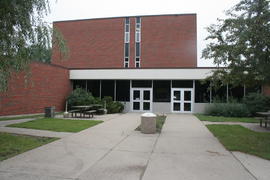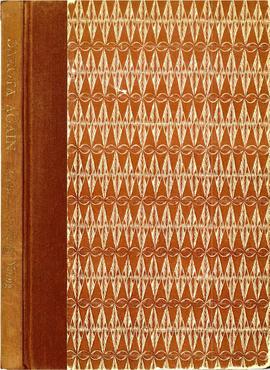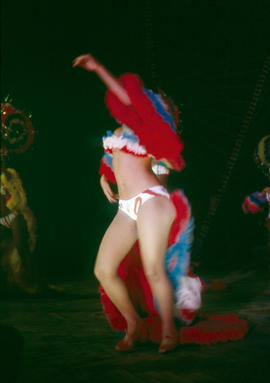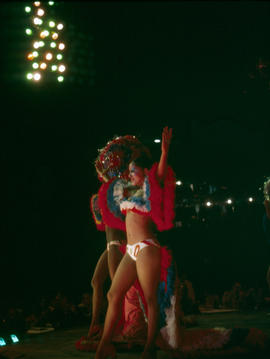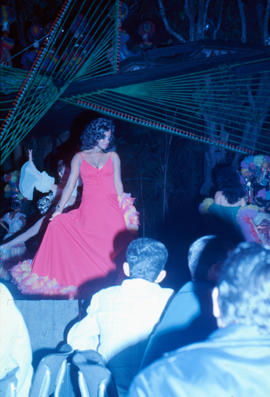R.F. Pettigrew sends a short message to H.L. Loucks detailing Pettigrew's return home and desire to see Loucks.
R.F. Pettigrew writes to H.L. Loucks concerning the Richards Law and current referendum in the State legislature. Pettigrew believes that Richards must go alone while still arguing for Primary Law. Pettigrew also mentions the continued desire to buy a newspaper though expresses his inability to do so with current funds.
R.F. Pettigrew responds to H.L. Loucks affirmation regarding Loucks money question. Pettigrew laments of his inability to financially help Loucks in his education endeavors and hopes that his financial condition will soon recover. Pettigrew also speaks boldly of his dislike for money and how it influences the people of Sioux Falls.
R.F. Pettigrew congratulates H.L. Loucks on his call to action in reference to a conference, one in which Pettigrew is most happy to attend. Pettigrew continues in speaking boldly of his dislike for the party system and their operations of disrepute.
R.F. Pettigrew articulates to H.L. Loucks his distaste for the book that Loucks recommended to him. Pettigrew also mentions that he would prefer to remain distanced from any conference with the author of the book. Pettigrew expresses great admiration and interest in Loucks' manuscript and desire to read it further.
H. L. Loucks writes to R.F. Pettigrew about the 1914 election for United States Senator from South Dakota and Edwin S. Johnson's campaign corruption.
H. L. Loucks writes to R.F. Pettigrew about his hopes for the national Progressive Party. He suggests that Pettigrew, Richard O. Richards and he start a newspaper to advance their political agenda. He mentions that the Saturday News in Watertown, South Dakota is for sale.
H. L. Loucks writes about the troubled state of politics in South Dakota. He mentions that he would be a part of the Republican Party if they would nominate progressive candidates. Loucks discusses the recent movement for farmers to organize. He mentions that Richard O. Richards has decided to remain in the Republican Party. Loucks believes that not all ballots cast for him were counted in the 1914 election.
H. L. Loucks writes about assisting Richard O. Richards in bringing up a suit to repeal Richards' primary law amendment. He also mentions that Richards does not want to start a newspaper. Loucks is still interested in finding a medium to publish his agenda and discusses the reliability of the press in South Dakota.
H. L. Loucks writes to R.F. Pettigrew about the leaflets he is publishing to promote progressive ideals. He thinks he will use the Rural Credit issue to bring attention to financial issues of farmers. Loucks mentions the upcoming 1916 elections and the likelihood of independent candidates.
H.L. Loucks expresses his doubt about joining Richard O. Richards in an independent political alliance. Loucks talks about not taking part in the state primary elections and that although he will not lead in the creation of an independent party, he will be willing to help the movement. Loucks asks Pettigrew to reread his address to the Christian Endeavor Society. He discusses his view regarding the money question and the preparedness issue.
H. L. Loucks writes to R. F. Pettigrew about a court case as to which Loucks is the primary counsel. Loucks mentions that he will use the argument going against the idea of 'rural credit.'; Loucks insists on Pettigrew visit Gifford and Amos Pinchot, whom Loucks deems capable of becoming national leaders.
H.L. Loucks responds to the R.F. Pettigrew and expresses sorrow for the current condition of Mrs. Pettigrew. Loucks also returns to his manuscript in speaking about how he wishes to take his time to write his statements and that Pettigrew may read and revise at his leisure, as there is no imminent reason that Loucks manuscript must be ready.
H.L. Loucks talks of his manuscript to R.F. Pettigrew, which has become something of a burden for him. Loucks also continues to talk of starting a new party, which will give them both leverage in the political realm. For now, Loucks determines that they ought to remain quiet and simply wait.
Loucks writes to R.F. Pettigrew concerning the cost of having part of the pamphlet printed as well as the pieces of the manuscript in friendly newspapers. Loucks hopes to copyright certain features of the pamphlet and manuscript to provide solid arguments. Mrs. Burgess urges Loucks to arrange a national call, which Loucks wishes to avoid at the present time.
Loucks talks to R.F. Pettigrew about the current state of their group which has not yet 'practical' levels in South Dakota. State Auditor J.E. Handlin is mentioned by Loucks for his earnest in taking a stand and Loucks wishes to stand by him. A Supreme Court plea is mentioned as well as various other people regarding politics and present status of South Dakota.
Loucks articulates to R.F. Pettigrew that an urgent call went out for a conference in Sioux Falls for their organization through the encouragement of Alli Reed. The call for a conference is not only to take place in Sioux Falls but also Chicago. Loucks also mentions that he believes the time is right for action for the Farmers Nonpartisan Political League.
R.F. Pettigrew talks with H.L. Loucks concerning the upcoming nomination for presidential candidate for the Republicans, as Pettigrew is hoping for a Progressive candidate as opposed to a reactionary one. Pettigrew also expresses his desire and agreement with Loucks concerning the procurement of numerous newspapers. Pettigrew also mentions various senators and party members, including Charles Edward Russell.
R.F. Pettigrew writes to H.L. Loucks concerning Loucks' address which shall be put into pamphlet form. Pettigrew mentions his great dislike for financiers of New York and the hope that Loucks' address will wake the people up from the spell of the financiers. Pettigrew also comments on the optimism that the people of the country will vote in a republican President.
R.F. Pettigrew expresses to H.L. Loucks the corruption and fraud of the current presidential administration. Pettigrew mentions his sadness and anger over those who would do nothing to change what has always been. Pettigrew reassures Loucks that his work will bear reward someday.
R.F. Pettigrew pens a letter to H.L. Loucks expressing his desire that Loucks would come visit him to discuss the matters at hand. Pettigrew also mentions that he is going to attempt to sell Loucks' article to Pearson's Magazine.
Letter from H. L. Loucks to R.F. Pettigrew about a the creation of the Progressive Party in South Dakota. The back of the letter is a copy of an article written by Loucks called 'The Grange and the Farmers' Problems,'; which discusses the European system of farmer cooperation and advocates its adaptation in the United States.
H. L. Loucks writes about his desire to be involved in politics at the national level. He mentions Richard O. Richards will continue his work with the primary law amendments and Loucks believes he will be an ally in the elections. He suggests that Pettigrew should contact progressive leaders throughout the United States.
H. L. Loucks writes to R.F. Pettigrew to make plans for visiting him in Sioux Falls, South Dakota and to visit other friends in Canto, South Dakota.
H.L. Loucks asks R. F. Pettigrew to read a copy of an address he gave at a meeting in St. Paul. Loucks states that he will not take part in the primary elections and that he cannot be part of the Progressive Party with Roosevelt and Perkins leading it. He feels that the Socialist Party's views are too narrow for him to join them. Loucks suggests that there is a good prospect in South Dakota for the rise of an independent party.
H.L. Loucks speaks of his manuscript to R.F. Pettigrew, which he is saddened that he must cut down so as to sell the finished manuscript for a set price. Loucks also mentions that he and Pettigrew should begin to plan for a general conference after the national convention. A mention of Richard O. Richards is also made near the end of the letter speaking of the national convention.
H.L. Loucks congratulates R.F. Pettigrew on his recent political fight, saying that Pettigrew gathered a substantial victory. Loucks also mentions his manuscript, the leaflet of Pettigrew's, and the potential publisher of both manuscripts. State primaries are coming and Loucks hope to circumvent any voting too far away from their party lines.
H.L. Loucks continues his previous discussion with R.F. Pettigrew concerning his manuscript and the purpose of said manuscript for their party. Loucks does not intend to wait for the potential publisher and instead plans to move ahead. Loucks hopes that Pettigrew will finish his review of the manuscript soon and forward the manuscript to Thomas Watson.
Loucks mentions to R.F. Pettigrew that Hampton is eager for Loucks to prepare an outline of his plan for 'rural credits.' Loucks briefs Pettigrew on the happenings of the Sioux Falls Conference in which his outline has been successful. Loucks also speaks of the new leadership within their organization and who will be helping to lead their organization.
R.F. Pettigrew discusses with H.L. Loucks the plan for rural credits which has not yet arrived. Pettigrew strongly states his opposition to class legislation as well as the explanation for such opposition. Pettigrew briefly states his eagerness to write a letter for Pearson's Magazine on the topic of class legislation.
Letter from H. L. Loucks to R.F. Pettigrew about the development of the Progressive Party. Loucks believes that the name should be changed due to the bad public image of progressivism. He mentions the anti-Catholic sentiments during the elections of 1914 around the country. He also talks about President Woodrow Wilson's policies and his tendency to support special interest groups. Loucks proposes a strategy for the Progressive Party for the 1916 elections. He also comments that the Republican candidate (Coe I. Crawford) wants to contest the election of Edwin Stockton Johnson (Democratic candidate) as Senator of South Dakota. Loucks states that he would like to see an investigation into the primary and election for the Senate seat.
H. L. Loucks writes to R.F. Pettigrew about losing the election for United States Senator from South Dakota. Loucks discusses campaign contributions to the national Progressive Party. He also talks about an investment opportunity for a plant to process flax straw.
1977 South Dakota men's basketball delegation to Cuba organized by Senator George McGovern and attended by students athletes from South Dakota State University and South Dakota State University, and Governor James Abourezk. Includes correspondence with McGovern and Martin. Notable documents include a letter of support from Secretary of State Henry Kissinger, press release from McGovern's office, trip itinerary and notes, photographs.
View of a courtyard in Havana, Cuba
Windows and plants in open air courtyard in Cuba
Photographers talking around a fountain in a courtyard in Cuba
Fountain in a courtyard in Cuba
Fountain in a courtyard in Cuba
Fountain in a courtyard in Cuba
Fountain in a courtyard in Cuba
Self portrait of photographer in mirror in courtyard in Cuba
Fountain in a courtyard in Cuba
Portrait of photographer in a courtyard in Cuba
People in a courtyard by a large ornate tower made of brick with a crumbling archway, Russian words written in Cyrillic script is on the building, taken during N.E. Hansen's trip to Semipalatinsk, Russia
Hazel Cowan, wife of Joseph Cowan from Webster, South Dakota was honored in 1978 as Eminent Homemaker by South Dakota State University and the South Dakota Board of Regents.
Two Hereford cows standing by a wooden fence next to a parked car on the McFadden farm
Mrs. L.B. Croll from Miller, South Dakota was honored in 1933 as Eminent Homemaker by the Eminent Farmer and Homemaker Club at South Dakota State College.
Percy R. Crothers from Badger, South Dakota was honored in 1928 as Eminent Farmer by the Eminent Farmer and Homemaker Club at South Dakota State College.
R.M. Crowder from Elk Point, South Dakota was honored in 1934 as Eminent Farmer by the Eminent Farmer and Homemaker Club at South Dakota State College.
Cuban national team player in jersey holds Cuban flag in opening ceremony of a game with South Dakota delegation
Cuban national team player and USA player in jerseys holding respective national flags in opening ceremony of a game in Cuba
Cuban man and woman in formal dress in restaurant in Cuba during a visit by South Dakota basketball delegation
Cuban man and women in formal dress in restaurant in Cuba during a visit by South Dakota basketball delegation
Cuban national team basketball player speaking with a man
Cuban national team basketball at a buffet line in South Dakota
Frank Cundill from Firesteel, South Dakota was honored in 1956 as Eminent Farmer by the Eminent Farmer and Homemaker Club at South Dakota State College.
Bernice Cuppy from Wecota, South Dakota was honored in 1991 as Eminent Homemaker by South Dakota State University and the South Dakota Board of Regents.
Joseph J. Curry from Elk Point, South Dakota was honored in 1950 as Eminent Farmer by the Eminent Farmer and Homemaker Club at South Dakota State College.
Leonard E . Dailey from Jefferson, South Dakota was honored in 1976 as Eminent Farmer by South Dakota State University and the South Dakota Board of Regents.
William Dailey from Flandreau, South Dakota was honored in 1932 as Eminent Farmer by the Eminent Farmer and Homemaker Club at South Dakota State College.
Biography of early South Dakota women containing chapters "Pioneer: Sarah Wood Ward; Churchwoman: Mary Uline Dunlap; Artist: Krete Kendall Miller; Scientist: Charlotte Elliott; Stateswoman: Gladys Pyle; Journalist: Lois Thrasher Clarke; Futility; Feathers; Frustration; Fancies; Finality; Faith"
Richard F. Daly from Columbia, South Dakota was honored in 1977 as Eminent Farmer by South Dakota State University and the South Dakota Board of Regents.
Dancers performing in Cuba
Dancers performing in Cuba
Dancers performing in Cuba
Dancers performing in Cuba
Dancers performing in Cuba
Dancers performing in Cuba
Dancers performing in Cuba
Chrys Daniel from Wentworth, South Dakota was honored in 1987 as Eminent Homemaker by South Dakota State University and the South Dakota Board of Regents.
William O. Daniel from Wentworth, South Dakota was honored in 1988 as Eminent Farmer by South Dakota State University and the South Dakota Board of Regents.
John Davies from Cresbard, South Dakota was honored in 1944 as Eminent Farmer by the Eminent Farmer and Homemaker Club at South Dakota State College.
Adele Davis, wife of Wilmer Davis from Brookings County, South Dakota, was honored in 1973 as Eminent Homemaker by South Dakota State University and the South Dakota Board of Regents.
Carrie Davis, wife of Willis H. Davis from Hitchcock, South Dakota, was honored in 1930 as Eminent Homemaker by the Eminent Farmer and Homemaker Club at South Dakota State College.
William M. Davis from Yale, South Dakota was honored in 1941 as Eminent Farmer by the Eminent Farmer and Homemaker Club at South Dakota State College.
Willis H. Davis from Hitchcock, South Dakota was honored in 1928 as Eminent Farmer by the Eminent Farmer and Homemaker Club at South Dakota State College.
- 1963 - B.S. Winthrop College
- 1966 - M.S. Winthrop College
- 1976 - Ph.D. Pennsylvania State University
- 1980-1984 - Head of Home Economics Education, Professor, Graduate Faculty
- 1988-1992 - Dean of the College of Home Economics, Professor, Graduate Faculty
- 1902 - B.S. Indiana Tri-State College
- 1907 - A.B. University of Indiana
- 1912 - A.M. Columbia University
- 1915-1917 - Professor, Head, Education
- 1917-1920 - Professor, Head, Vocational Education
- 1969 - B.S. University of Tennessee
- 1976 - M.S. University of Tennessee
- 1984 - Ph.D. University of Pennsylvania
- 1988-1992 - Head of Home Economics Education, Associate Professor
- 1992-1994 - Dean of the College of Home Economics, Professor, Graduate Faculty
- 1977 - B.S. Jacksonville University
- 1978 - M.A. University of Alabama
- 1986 - Ph.D. University of Alabama
- 1990-1992 - Extension Home Ec Program Leader, Assistant Professor
- 1992-1994 - Program Leader-Home Economics, Associate Professor
- 1994-1996 - Acting Dean of the College of Home Economics, Professor, Graduate Faculty
- 1998-2002 - Dean of the College of General Registration, Professor, Graduate Faculty
- 2000-2007 - Dean of the College of General Studies and Outreach Programs, Professor, Graduate Faculty
- 2007-2012 - Dean of the Office of Continuing and Extended Education, Professor, Graduate Faculty
- 2012-2023 - Deam Emerita of Continuing and Extended Education
- 1953 - B.S. University of Nebraska
- 1962 - M.S. University of Nebraska
- 1966 - Ed.D. University of Nebraska
- 1966-1968 - Assistant Professor, Education
- 1969-1970 - Associate Professor, Education, Graduate Faculty
- 1970-1977 - Professor, Head of Education Department, Graduate Faculty
- 1980-1984 - Professor, Education, Chief of Botswana Party, Graduate Faculty
- 1988-1990 - Professor, Education
- 1990-2021 - Professor Emeritus, Education
- 1959 - B.S. South Dakota State University
- 1966 - M.S. Iowa State University
- 1974 - Ph.D Iowa State University
- 1966-1970 - Assistant Professor of Home Economics Education
- 1970-1971 - Acting Head of Home Economics Education
- 1975-1984 - Dean, Home Economics, Professor, Graduate Faculty
- 1988-2002 - Dean Emerita of Home Economics, Professor Emerita

